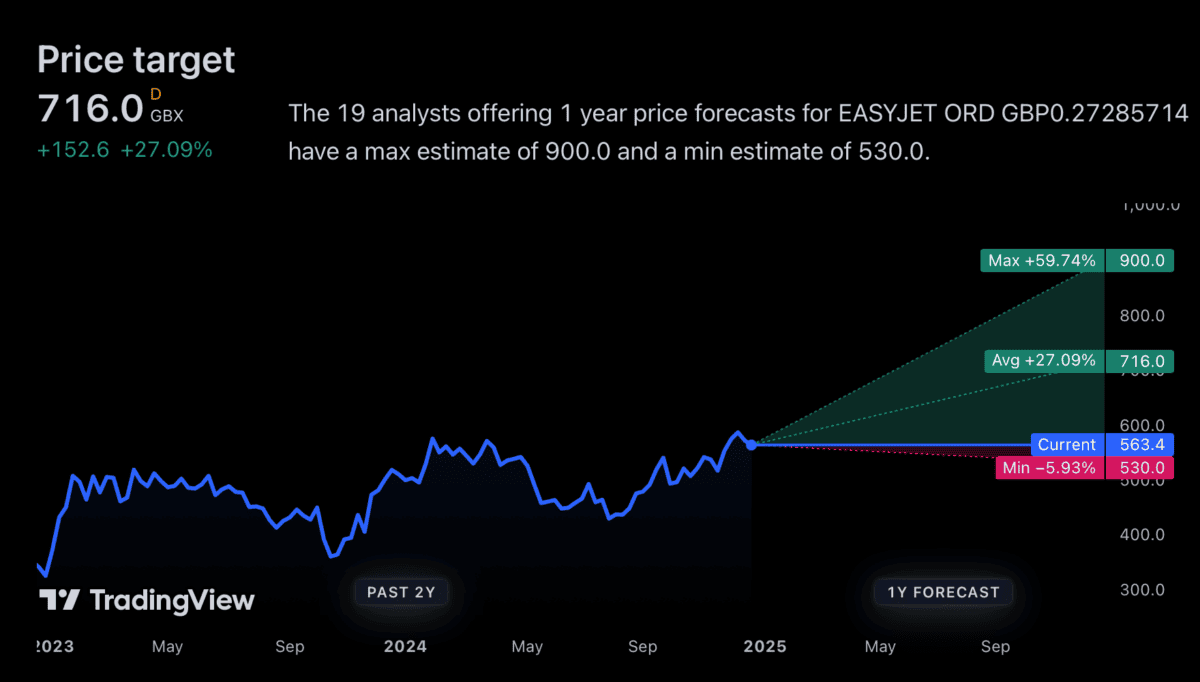Analyst price targets for easyJet (LSE:EZJ) shares are fairly positive going into 2025. While most see the stock going higher, the most optimistic I can find sees the share price reaching £9.
easyJet analyst price targets
Source: TradingView
Fuel is one of the airline’s largest expenses and the prospect of lower oil prices could be good for profit margins. But is it realistic to think the stock could climb 60% from its current level?
Cyclicality
The key thing to understand with easyJet shares is how cyclical the airline industry is. Whether it’s a pandemic, an Icelandic ash cloud, or an ordinary recession, there’s always a high risk of exogenous shocks with airlines.
This means earnings are likely to be volatile – falling sharply in some years, as well as climbing rapidly in others. And this has important implications for what multiples these stocks should trade at.
Right now, easyJet shares trade at a price-to-earnings (P/E) multiple of 9. That doesn’t look especially high, but it might be if profits are going to be lower for the next 10, 20, or 30 years.
Investors therefore shouldn’t read too much into any individual year’s earnings. The question is whether profits are going to be higher or lower for the foreseeable future.
Fuel costs
According to Peel Hunt – the source of the £9 price target – lower fuel costs could cause easyJet’s pre-tax profits to climb by up to 5%. And I think this is highly plausible.
I’m expecting increased oil output from the two largest producers – the US and Saudi Arabia – in 2025. I can’t see demand growing enough to offset this, so I think prices are likely to fall.
That should result in lower jet fuel prices, which should boost easyJet’s margins. But the question is whether or not this justifies a 60% increase in the share price.
Lower fuel costs aren’t the only reason for optimism heading into 2025. But they’re the reason Peel Hunt’s analysts have boosted their price target from £8.50 to £9.
Valuation
That £9 price target gives easyJet a market value of around £6.8bn. That puts the stock at a P/E ratio of 11 based on anticipated pre-tax earnings for 2025, which is higher than the multiple it currently trades at.
That makes me wary. While easyJet’s margins might be set to benefit from lower fuel costs, there’s a lot that could cause the increase in profits to be temporary rather than permanent.
An obvious example is political instability in the Middle East. This is an ongoing issue that could cause oil prices to rise and there’s not much easyJet can do to prevent it cutting into earnings.
With a cyclical business like an airline, I always look to buy shares at a price that factors in the risks the company can’t control. And I don’t think £9 does this with easyJet.
How realistic is a £9 share price?
I’d be surprised to see easyJet hit that share price in 2025, but I do think there’s scope for it to move up. The prospect of lower fuel costs should be a genuine boost for the company.
Investors however, should think carefully about how durable lower oil prices will be. Things can move quickly – in either direction – and easyJet’s inability to control this makes it risky.





